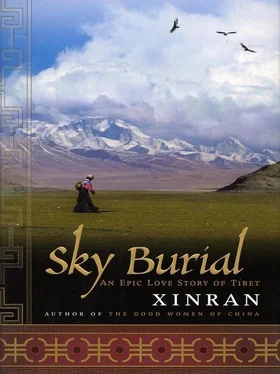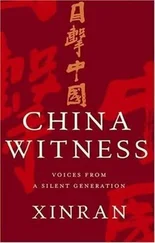Evening began to draw in and they realized that they needed somewhere to stay. In a little street, they found a small guesthouse owned by a retired Chinese teacher, who showed them where they could keep their horses. He told them he had been sent to Tibet twenty years ago. He had found it very difficult to settle in, but at least there was less class struggle and political study here. Wen pretended to understand what he was talking about, but her tired mind could make no sense of it. What did he mean by “class struggle” and “political study”?
During the night, Wen and Zhuoma heard an urgent knocking at their door. Wen instinctively reached for her half book of essays, and Kejun’s photograph and diary, which she had placed under her pillow before going to sleep. When she opened the door, they found Tiananmen standing there in a state of high excitement.
“Come and look,” he said. “We are in heaven.”
Wen and Zhuoma followed him to his attic room. He stood by the window. Outside, Lhasa was a blaze of electric light.
Wen and Zhuoma looked at each other. They had each passed nights in Nanjing and Beijing. It was hard to imagine what a modern city must look like to someone who had never seen electricity.
In the morning, the owner of the guesthouse told Wen she could use his bathroom. As she stood beneath the primitive shower-a thin plastic tube that protruded from a tub of water above her head-she was reminded of her luxurious wash at the army base in Zhengzhou all those years ago, at the beginning of her journey to Tibet. What if she had known then that she wouldn’t enter a bathroom again until now? Her older self was astonished by the innocence and bravery of her youth.
Zhuoma said she didn’t understand these Chinese gadgets, and scrubbed herself down with water from a bowl. Tiananmen declared he could only wash in the river, and there was nothing the two women could do to persuade him otherwise.
Later that morning, they went to worship at the Potala Palace. Wen stood at the foot of the steep, ladderlike steps that led up to the towering palace. It was the most extraordinary building she had ever seen-vast, beautiful, and taller than she could have imagined. In front of her, crowds of people were climbing the stairway to the palace entrance, stopping every three steps to prostrate themselves. Maybe Kejun had always meant to bring her to this place. Perhaps it was preordained that she should travel all the way to Tibet from the Yangtze delta to make this ascent and be received into the religion of the spirits. She began to climb, bowing like the people around her and quietly intoning, “Om mani padme hum.”
Once inside the palace, the three friends made their way along dark corridors, first through a magnificent assembly room, then through courtyards and chapels. There were rooms lined with precious books and scrolls, finely embroidered wall hangings, statues of the Buddha draped in beautiful silk brocade cloths and colored scarves, and many shrines. All was aglow with yellow light from the burning yak-butter lamps.
In the so-called White Palace they marveled at the luxury of the Dalai Lama’s living quarters. The architecture and furnishings were exquisite. Delicately wrought golden teapots and jade bowls rested on tea tables. Brocade quilts dazzled the eye with their magnificent embroidery. In the Red Palace they saw the spirit towers, encrusted with gold and precious gems, which contained the remains of past Dalai Lamas. There were thousands of rooms. Wen had had no idea that Tibet contained such wealth. Her head was spinning. She paused to catch her breath. Beside her was a wall painting depicting a marriage. She realized that it was the marriage of Songtsen Gampo to Princess Wencheng, for whom the original palace had been built in the seventh century. She thought of Kejun’s last words: “All we wanted to do was bring Chinese knowledge to you, to improve your lives, as Princess Wencheng did more than a thousand years ago.” While all around her pilgrims chanted the scriptures, she sat and prayed until Zhuoma drew her away.
EVERYONE THEY talked to in Lhasa told them that they would need permission from the personnel department of their “work unit” to go to China. They could travel to Beijing by airplane, but not without written authority to do so. Zhuoma and Tiananmen were bemused by this. What was a “work unit”? Did they have such a thing? When Tiananmen suggested that his monastery might be his work unit, Wen didn’t know whether to laugh or cry. She told them that she would appeal to the military headquarters for the necessary travel documents.
It was not difficult to find the headquarters. All the locals seemed to know where it was and they soon found themselves in front of a military compound whose large gate was inscribed with the words TIBET REGION MILITARY DEPARTMENT. As they stood before it, debating about what to do, an armed guard came toward them and asked politely what they wanted.
“I am here to try to trace my missing husband,” she said.
Wen watched the guard make several telephone calls inside the compound and, before long, a man appeared who seemed to be an officer. After asking their names and relationship to each other, he took them into a reception room comfortably furnished with sofas and tea tables.
Tiananmen kept very close to Zhuoma and copied everything she did. He sat down gingerly and was clearly amazed at how soft the sofa was. Wen felt as if she had just walked into a Chinese home. She could still remember how comfortable the battered old sofa in her parents’ house used to be. As she sipped the green tea that the officer had brought to them, tears of recognition came to her eyes.
Wen told the officer as briefly as she could about herself and her experiences: about Wang Liang at the Zhengzhou military base, the vehicle convoy that had brought her into Tibet, what had happened to her during the intervening years, and the story of Kejun’s martyrdom. She told him that she wished to know what records the army held of Kejun’s death and whether they knew of his heroism. She said that she would like to return to China.
The officer looked at her in amazement. He seemed profoundly moved by what she had told him. He would very much like to help her, he said, but he had only arrived in Tibet eight years ago and had no idea how to start making the inquiries she asked for.
Could he, nevertheless, give them a permit to travel to China? Wen asked him. The officer explained that he needed to confirm their story before he could do so, but he would certainly get in touch with headquarters in Beijing and see what he could find out. He warned her not to be too hopeful: during the Cultural Revolution, many files had been lost or burned.
“What do you mean by the ‘Cultural Revolution’?” Wen asked, bemused.
The officer looked at her.
“If you can stay a little longer,” he said, “I will try to explain to you what has happened in China over the past thirty years.”
Wen and Zhuoma listened in bewilderment as the officer talked of the “Famine” in the 1960s, the “Cultural Revolution” in the 1970s, Deng Xiaoping’s “Reform and Opening” in the 1980s, and the “current economic reforms.” Tiananmen sat cross-legged in a corner, telling his rosary beads and reciting the scriptures.
Wen had to wait several days before she was summoned by letter to return to the military headquarters. This time she alone was allowed to enter the compound, since Tiananmen and Zhuoma were not named in the letter. There she was greeted by the officer she had met before, along with an older man. The older man apologized that her friends had had to be left outside and promised they would be well looked after. He introduced himself as one of the generals in charge of the troops stationed in Lhasa and told Wen that they had checked all the names and the unit number she had given them. Sadly, there were too many people with the name Wang Liang to be able to trace the particular officer she was talking about, especially since many of the records had been lost and information about that time was so unreliable. However, they had been able to verify that there was indeed a unit with the number she had given based in Chengdu. The records stated, though, that all its members had been killed.
Читать дальше












